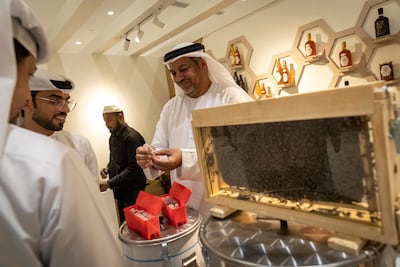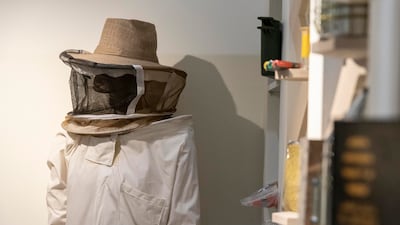Some Emirati beekeepers are producing up to half as much honey as they did five years ago, largely as a result of climate change and falling bee population, according to apiarists at the Hatta Honey Festival this week.
The five-day event attracted about 60 UAE beekeepers looking to make their annual windfall by showing off unique varieties of honey that are not available in regular supermarkets.
Ali Al Dahmani is a seller of Sidr and Samar honey, two of the most sought-after varieties in the UAE, who said his production is dwindling each year.
“We made around 1,000 kilos this year. But five years ago, I used to make 2,000 kilos of honey. Every year, I produce less and less,” Mr Al Dahmani, a second-generation honey seller based in Fujairah, told The National.
He belongs to a diminishing group of Emirati honey makers who continue to harvest honey from natural beehives in mountains and wadis across the UAE.
Among the prized displays at his stall in the Hatta Hall is a one-kilo packet of Sidr honey derived from Sidr trees pollinated by wild local bees in the wadis of Fujairah.
“This one-kilo packet of honey with the hive costs Dh1,000. And after a year or two, I can sell it for anything between Dh2,000 and Dh2,500.
“Al Dahmani honey is naturally made. We are not importing bees from Egypt and other countries like many others,” he said.
World honey takes a hit
The decline in honeybee populations is a growing concern globally.

In the US, 30 per cent of honeybee hives are lost each year. The US is one of the worst affected countries, but everywhere is registering a decline, from an almost 17 per cent annual loss in Canada to nearly 12 per cent in central Europe.
Bees are critically important pollinators, carrying pollen from one plant to another, thereby helping fertilise plants so they can produce fruit and seeds.
Bees are crucial for the world's food security as 90 per cent of our food comes from fruits, vegetables and nuts that bees help pollinate.
Some of the main reason why bees are dying are pesticides, drought, habitat destruction, nutrition deficit, air pollution, global warming.
Reda Wafi, owner of Sharjah-based AlReda Bee and Honey, said seasonal changes, such as prolonged summer months, pose a significant threat to local honey production.
“It is getting too hot for bees. And when there are not enough trees for them to pollinate, we don’t get enough honey,” he said.
But he is hopeful that events like the Hatta festival can address the concerns of honey makers and raise public awareness. The festival ended on Sunday.
Climate mitigation measures are deemed crucial, as honey traders face the impact of biodiversity loss. The harvesting season for Sidr honey in the UAE is from September to December. However, even September and October are proving to be excessively hot, negatively affecting honey production.
'Climate shock' for imported bees
The diminishing honeybee population has prompted many companies to import bees from countries like Egypt and Algeria, making concerns about sustainability worse.
Anas Azzi, sales manager at Emirates Beekeepers Trading in Dubai, reveals that they import “millions of bees” just before the season starts for Sidr, Samar, Mangroves, or Flower honey.
“This year alone, we brought one million boxes from Egypt. Each box will have at least five frames with thousands of bees and a queen bee per frame,” he said.
Mr Azzi said that many prefer Egyptian bees because they are bigger, capable of producing more honey per frame, approximately two kilos, with superior quality.
Even as domesticated hives are appearing all over the UAE, researchers said importing bees is not the answer to sustainable beekeeping.
Meriam Hammal, business development manager at OneHive, a UAE-based company that aims to prevent bees from extinction, said the import of foreign bees has caused “genetic pollution”.
“It is hard to find the local bee called Apis Mellifera honeybees any more because of the genetic pollution,” Ms Hammal told The National.
According to her, the imported bees get “climate shock' as they are not accustomed to the local weather and die quickly.
“So, when they bring bees, they don't know what they are doing. During one season when it's not hot, they can produce (honey) but after that, during the summer, which is by the end of July, August and September, these bees cannot survive here and they die.
“What beekeepers are doing is letting them die, and the next season they will bring new bees. So there is no sustainability for this,” she said.
At the OneHive Honeybee Garden and Discovery Centre in Hatta, Ms Hammal said they are reviving the local bees and educating local beekeepers about more sustainability.
The centre also purchases bees back from them after the season ends and relocates the insects to cooler areas.
“Bees are key for our survival. Reviving bee population is a win-win,” she said.










